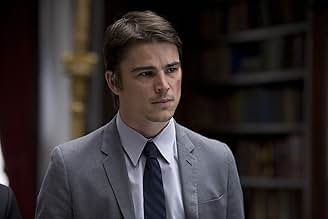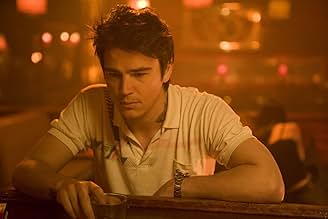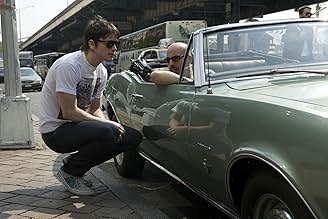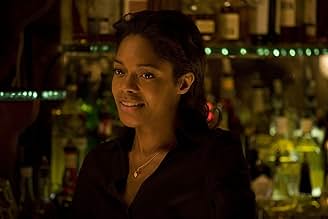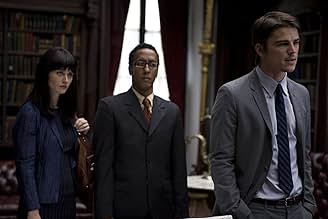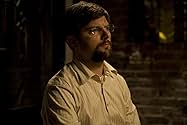IMDb-BEWERTUNG
5,3/10
4415
IHRE BEWERTUNG
Im Mittelpunkt stehen zwei Brüder, die im August 2001, einen Monat vor den Terroranschlägen vom 11. September, darum kämpfen, ihr Start-up-Unternehmen an der Wall Street am Leben zu erhalten... Alles lesenIm Mittelpunkt stehen zwei Brüder, die im August 2001, einen Monat vor den Terroranschlägen vom 11. September, darum kämpfen, ihr Start-up-Unternehmen an der Wall Street am Leben zu erhalten.Im Mittelpunkt stehen zwei Brüder, die im August 2001, einen Monat vor den Terroranschlägen vom 11. September, darum kämpfen, ihr Start-up-Unternehmen an der Wall Street am Leben zu erhalten.
Joie Chen
- Newscaster
- (Synchronisation)
Empfohlene Bewertungen
This is the surprise of the year so far for me.
This excellent little film tells a story of two brothers and their struggling company in a timeline that just precedes 9/11. Several people on IMDb have commented that they don't see why the movie needed to be "cheapened with a 9/11 theme" or some such nonsense. Let's be clear: this movie is not about 9/11 but this was historically a crucial point for the dot-com bubble.
The movie does actually a wonderful job highlighting these events, without spelling them out in some awkward exposition. The story focuses mostly on one of the brothers: The Charismatic Tom (played by Josh Hartnett), who mostly handles the business aspects. Director Austin Chick does a good job immersing us in his life, his lifestyle, his struggles and his ambiguities. His uneasy rapports with his brother Joshua, co-founder of the company "Landshark", who is the quiet "tech guy" behind the operation. With his parents. His former girlfriend. Various other persons in his life and business dealing. It's an absolutely fascinating portrait. What really helps is Hartnett's performance. Now, I'm sorry to say I never was a fan of this fairly popular actor and he had failed to impress me until now... but this has changed. Hartnett is in fact the main strength of this movie, makes the story come alive and shines among a very, very solid cast around him. Tom's role as a confident, brash young guy who must keep appearance and keep his company afloat while he knows it's going down (along with his personal life) required a good acting palette.
It is a strength of the movie that it manages to push both the story of Tom and present an interesting portrait of this time period where economically, things were crashing. What we have here is a movie that could very well have been boring to death due to its topic (finances are a fairly abstract thing, and usually not terribly interesting unless they're your own) but instead becomes fascinating. In many ways, it is reminiscent of Wall Street. Various speeches that Tom delivers and his bout of negotiations lead to several strong moments.
This is a great movie. Where pretty much every scene is worthwhile and supports the overall themes that are pushed. Director Chick seems to have a purpose with every element presented and even the elements not present. Consider: we never get to know what Landshark does. At all. Which might seem weird yet is terribly fitting since along with other shooting star companies of the time, it was all a smoke screen anyway.
Great movie, probably a must buy for those who have an interest in the dot-com bubble.
This excellent little film tells a story of two brothers and their struggling company in a timeline that just precedes 9/11. Several people on IMDb have commented that they don't see why the movie needed to be "cheapened with a 9/11 theme" or some such nonsense. Let's be clear: this movie is not about 9/11 but this was historically a crucial point for the dot-com bubble.
The movie does actually a wonderful job highlighting these events, without spelling them out in some awkward exposition. The story focuses mostly on one of the brothers: The Charismatic Tom (played by Josh Hartnett), who mostly handles the business aspects. Director Austin Chick does a good job immersing us in his life, his lifestyle, his struggles and his ambiguities. His uneasy rapports with his brother Joshua, co-founder of the company "Landshark", who is the quiet "tech guy" behind the operation. With his parents. His former girlfriend. Various other persons in his life and business dealing. It's an absolutely fascinating portrait. What really helps is Hartnett's performance. Now, I'm sorry to say I never was a fan of this fairly popular actor and he had failed to impress me until now... but this has changed. Hartnett is in fact the main strength of this movie, makes the story come alive and shines among a very, very solid cast around him. Tom's role as a confident, brash young guy who must keep appearance and keep his company afloat while he knows it's going down (along with his personal life) required a good acting palette.
It is a strength of the movie that it manages to push both the story of Tom and present an interesting portrait of this time period where economically, things were crashing. What we have here is a movie that could very well have been boring to death due to its topic (finances are a fairly abstract thing, and usually not terribly interesting unless they're your own) but instead becomes fascinating. In many ways, it is reminiscent of Wall Street. Various speeches that Tom delivers and his bout of negotiations lead to several strong moments.
This is a great movie. Where pretty much every scene is worthwhile and supports the overall themes that are pushed. Director Chick seems to have a purpose with every element presented and even the elements not present. Consider: we never get to know what Landshark does. At all. Which might seem weird yet is terribly fitting since along with other shooting star companies of the time, it was all a smoke screen anyway.
Great movie, probably a must buy for those who have an interest in the dot-com bubble.
Perhaps its because i don't really know anything about the stock market and my ignorance in that area relates to how much i enjoyed the film, maybe if i knew anything about stocks i would have enjoyed the film as much as some of the other people who have commented...but i didn't. I am a fan of josh hartnett and thought the acting was good i just don't think he and the rest of the cast had anything to work with. Perhaps if there was more information about there struggling company as well as more general background info i would have spent less time staring blankly at the wall and more time staring at the film.
i wouldn't recommend this film to someone like me who knows nothing about wall street but then again i wouldn't recommend this even if you worked on wall street, without more background i think this film has greatly reduced its target audience which could have been potentially every one to a small percentage.
i wouldn't recommend this film to someone like me who knows nothing about wall street but then again i wouldn't recommend this even if you worked on wall street, without more background i think this film has greatly reduced its target audience which could have been potentially every one to a small percentage.
August is a very finite and pointed film. It's a low-flying indie sleeper that has its points to make and it makes them quite effectively. Above all it really manages to nail a small moment in time, that of the dot-com implosion.
I, along with many others I'm sure, was part of a dot com start-up similar in some respects to Landshark. It was very common in those days of over-hyped speculation to bet tons of VC generated start-up capital on IDEAS that looked promising, when in reality much needed to happen before they could be realized. This didn't hold true for all start-ups, but a fair majority.
It's very easy to get caught up in the delusion that you're a "real" company when your stock is shooting up the charts and quite a glass of ice water to the face to realize all that speculated valuation can disappear overnight, which it did slowly over the course of late 2000 and 2001...it was never really there to begin with.
August grabs that bursting bubble in a number of effective ways. As the film progresses, it becomes apparent that for all of Tom's boasting and bluster, he's nothing more than a hyped-up spin doctor. Watching this revelation sink his ego is entertaining if not more than a bit sad. Hartnett does an adequate job with the role.
The most true-to-life scene for me was the mass of staffers flocking around F**kedCompany.com, which was a popular barometer for the sink-age rate of companies about to go belly-up, instead of lounging at their Ikea desks playing solitaire...they're not lazy, they just have nothing to do...no customers, no product.
As a film, this is a tough one to sell to an audience who doesn't have first-hand experience in the story's premise. There is a lot of business/financial terminology/slang thrown around that to those not knowledgeable or interested in it will seem very boring.
It does what Indies do best...present a slice of life, with no pat clichés or feel-good endings. And for that, I liked it.
I, along with many others I'm sure, was part of a dot com start-up similar in some respects to Landshark. It was very common in those days of over-hyped speculation to bet tons of VC generated start-up capital on IDEAS that looked promising, when in reality much needed to happen before they could be realized. This didn't hold true for all start-ups, but a fair majority.
It's very easy to get caught up in the delusion that you're a "real" company when your stock is shooting up the charts and quite a glass of ice water to the face to realize all that speculated valuation can disappear overnight, which it did slowly over the course of late 2000 and 2001...it was never really there to begin with.
August grabs that bursting bubble in a number of effective ways. As the film progresses, it becomes apparent that for all of Tom's boasting and bluster, he's nothing more than a hyped-up spin doctor. Watching this revelation sink his ego is entertaining if not more than a bit sad. Hartnett does an adequate job with the role.
The most true-to-life scene for me was the mass of staffers flocking around F**kedCompany.com, which was a popular barometer for the sink-age rate of companies about to go belly-up, instead of lounging at their Ikea desks playing solitaire...they're not lazy, they just have nothing to do...no customers, no product.
As a film, this is a tough one to sell to an audience who doesn't have first-hand experience in the story's premise. There is a lot of business/financial terminology/slang thrown around that to those not knowledgeable or interested in it will seem very boring.
It does what Indies do best...present a slice of life, with no pat clichés or feel-good endings. And for that, I liked it.
In "August," Josh Hartnett plays a cocky, twenty-something entrepreneur named Tom Sterling who, for the past several years (the movie is set in the early 2000s), has been riding the dot.com wave to easy fame and fortune - though he isn't quite prepared, either financially or emotionally, for the crash that is to come. Landshark, the company he founded with his brother, Joshua (Adam Scott) and of which he is currently CEO, has a couple hundred employees on its payroll, but pretty much everyone who works there is at a loss to explain just what it is the firm does or produces. Even worse, the company that was once valued at well over three-and-a-half million dollars is now worth just a paltry fraction of that amount, the "business model" having apparently failed to pan out as expected.
As written by Howard A. Rodman and directed by Austin Chick, "August" is essentially a cautionary tale set against the get-rich-quick hysteria that came to dominate in the early days of the internet, when virtually anybody with a half-baked idea and a smidgen of techno-savviness could become a high-stakes player on Wall Street. That many of these people were making their fortunes out of little more than the cyber equivalent of chewing gum and bailing wire – while producing nothing of any real substance or value in the long run – is what eventually led to disaster for so many of them and for the economy as a whole.
"August" does a reasonably effective job capturing the moral emptiness and emotional shallowness of the characters and the world they inhabit, but, when all is said and done, the movie lacks the dramatic heft and focus needed to turn it into a profound and major work. The minor characters are bland and insufficiently developed, and even Tom is deficient in the kind of depth and shading he would need to make him a representative "tragic hero" for our time. That being said, the movie does offer some intriguing insights into the way the business world works these days and into which type of individual typically succeeds in the new arena. And which type fails.
As written by Howard A. Rodman and directed by Austin Chick, "August" is essentially a cautionary tale set against the get-rich-quick hysteria that came to dominate in the early days of the internet, when virtually anybody with a half-baked idea and a smidgen of techno-savviness could become a high-stakes player on Wall Street. That many of these people were making their fortunes out of little more than the cyber equivalent of chewing gum and bailing wire – while producing nothing of any real substance or value in the long run – is what eventually led to disaster for so many of them and for the economy as a whole.
"August" does a reasonably effective job capturing the moral emptiness and emotional shallowness of the characters and the world they inhabit, but, when all is said and done, the movie lacks the dramatic heft and focus needed to turn it into a profound and major work. The minor characters are bland and insufficiently developed, and even Tom is deficient in the kind of depth and shading he would need to make him a representative "tragic hero" for our time. That being said, the movie does offer some intriguing insights into the way the business world works these days and into which type of individual typically succeeds in the new arena. And which type fails.
Good storytelling can either tell you what happens, tell you how it was, or both. Most moviegoers, the superficial ones, watch a movie for the "what happens." They want to meet a character that they like and see something good happen to them with a good in between. And so when they watch a movie they expect a story and they like it or dislike it without considering everything that the movie is trying to do. Don't make that mistake when watching August.
August is a movie that tells a story, a "this is what happened to Tom and his company and his brother and his life", but that is not the REAL of this movie. This movie does a much better job of telling the movie watcher a "this is how it was" than a "this is what happens." So when you watch August, which i think you should, absorb the movie for the parts that elaborate on the environment, the time, place, and attitudes, surrounding August 2001, not just the story or the dialog or the sometimes lack thereof.
It's a movie that tells the story of two brothers that started a dotcom that survived the tech bubble collapse and its story in reality does the job of representing the not so apparent futures of the people left in the dotcom world after its demise.
What is even more enjoyable about the movie than its overall plot, which, like i said, isn't the real story, is Josh Hartnett's character, who not only represents the image of the dotcom-er CEO circa 1999 but also speaks the truly empty rhetoric of the times that feed and fueled the tech bubble for so long. Just listening to his speech and realizing that he's talking about practically nothing but making it sound like he's preaching the new age gospel, the evangelical oratory of the e-generation, in part, produces the statement the movie is trying to make about the times.
So don't watch this movie for the "story" or to "see what happens." Watch this movie with the understanding that its a movie that tries to capture a period in time: its character's and its subplots"/"devices" being either deeper (representing something/someone more generic), or being empty (just a way to kill time or build a character in a way that is unimportant to the "deeper meaning").
Enjoy the movie. Just be aware of what to look out for.
August is a movie that tells a story, a "this is what happened to Tom and his company and his brother and his life", but that is not the REAL of this movie. This movie does a much better job of telling the movie watcher a "this is how it was" than a "this is what happens." So when you watch August, which i think you should, absorb the movie for the parts that elaborate on the environment, the time, place, and attitudes, surrounding August 2001, not just the story or the dialog or the sometimes lack thereof.
It's a movie that tells the story of two brothers that started a dotcom that survived the tech bubble collapse and its story in reality does the job of representing the not so apparent futures of the people left in the dotcom world after its demise.
What is even more enjoyable about the movie than its overall plot, which, like i said, isn't the real story, is Josh Hartnett's character, who not only represents the image of the dotcom-er CEO circa 1999 but also speaks the truly empty rhetoric of the times that feed and fueled the tech bubble for so long. Just listening to his speech and realizing that he's talking about practically nothing but making it sound like he's preaching the new age gospel, the evangelical oratory of the e-generation, in part, produces the statement the movie is trying to make about the times.
So don't watch this movie for the "story" or to "see what happens." Watch this movie with the understanding that its a movie that tries to capture a period in time: its character's and its subplots"/"devices" being either deeper (representing something/someone more generic), or being empty (just a way to kill time or build a character in a way that is unimportant to the "deeper meaning").
Enjoy the movie. Just be aware of what to look out for.
Wusstest du schon
- WissenswertesThe film takes place in August 2001.
- VerbindungenFeatures Ein andalusischer Hund (1929)
- SoundtracksSweetness
Written by Warren Fischer, Casey Spooner
Performed by Fischerspooner (as Fisherspooner)
Courtesy of Fischerspooner
Under exclusive license to Capitol Records
Under license from EMI Film & Television Music
Top-Auswahl
Melde dich zum Bewerten an und greife auf die Watchlist für personalisierte Empfehlungen zu.
- How long is August?Powered by Alexa
Details
- Erscheinungsdatum
- Herkunftsland
- Offizielle Standorte
- Sprache
- Auch bekannt als
- August
- Drehorte
- Produktionsfirmen
- Weitere beteiligte Unternehmen bei IMDbPro anzeigen
Box Office
- Budget
- 3.400.000 $ (geschätzt)
- Bruttoertrag in den USA und Kanada
- 12.636 $
- Eröffnungswochenende in den USA und in Kanada
- 8.092 $
- 13. Juli 2008
- Weltweiter Bruttoertrag
- 12.636 $
- Laufzeit1 Stunde 28 Minuten
- Farbe
- Sound-Mix
- Seitenverhältnis
- 2.39 : 1
Zu dieser Seite beitragen
Bearbeitung vorschlagen oder fehlenden Inhalt hinzufügen

Oberste Lücke
By what name was Der Börsen-Crash (2008) officially released in India in English?
Antwort

